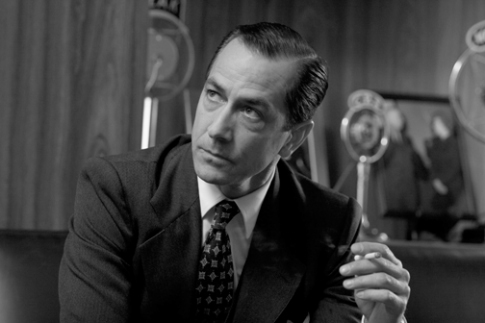Although faithful to the record (and including actual footage of Sen. Joseph McCarthy, which caused preview audiences to say “I think the actor playing McCarthy was way over the top,”) George Clooney’s Good Night, and Good Luck has a major limitation as a historical story: it comes into the story too late. By focusing on only one aspect of the media and McCarthy–the events that led to Edward R. Murrow denouncing him on CBS’ See It Now news broadcast–it ignores the years of media collusion with McCarthy before that moment, and the Army/McCarthy hearings that did the real job of destroying him afterwards. It has the kind of plot of which Aaron Sorkin never tires: a team of elite white men (and a white woman or two) struggle to find the courage to do the right thing and once they do, it’s over.
Given that limitation, it’s still a damn fine film. Clooney and co-writer Grant Heslov create a tight, quick plot and finish it in 90 minutes. In his second film, Clooney really honors his father Nick (a former television anchorman) and feels completely at home in a world of studios, desks, typewriters, and bars where everyone reads the next day’s newspapers; like John Frankenheimer (who also got his start on television), he has a great eye for frames-within-the-frame. Robert Elswit shoots it all in lush black-and-white, and Dianne Reeves is on hand to provide some gorgeous in-studio singing. The cast (including Clooney, Heslov, Reed Diamond, Tate Donovan, Patricia Clarkson, Frank Langella, Robert Downey Jr., Ray Wise, and Tom McCarthy) gives a uniformly strong ensemble performance and DAMN can they wear period clothes well. The standout, as it should be, is David Strathairn as Murrow; there are almost no other actors who convey intelligence as well as he does. His little choreography of reading–eyes down to the text, eyes up to the camera–conveys thought with the simplest gesture and, along with Clooney’s direction, turns what would be static passages into music.
Good Night, and Good Luck (streaming free on Amazon Prime) isn’t a story of liberal values, because it doesn’t take those values to their limits. (David Halberstam’s The Best and the Brightest would be a much better story, really a tragedy, of American liberalism.) Rather it’s a pageant of those values, a demonstration of them, and as such it’s valuable. Every now and then it’s worth it to have someone flat-out say what those values are, and what the stakes of holding those values are. Murrow did one of the best jobs of that, ever, in words that are some of the greatest in American history. In the film, Murrow says “it’s Shakespeare.” He’s not wrong–I would put this next to the St. Crispin’s Day speech. Say it with Murrow, with Strathairn, and with me:
We must not confuse dissent with disloyalty. We must remember always, that accusation is not proof, and that conviction depends upon evidence and due process of law. We will not walk in fear, one of another. We will not be driven by fear into an age of unreason if we dig deep into our history and our doctrine, and remember that we are not descended from fearful men. Not from men who feared to write, to associate, to speak, and to defend the causes that were for the moment unpopular.
This is no time for men who oppose Sen. McCarthy’s methods to keep silent or for those who approve. We can deny our heritage and our history but we cannot escape responsibility for the result. We proclaim ourselves as indeed we are, the defenders of freedom wherever it continues to exist in the world. But we cannot defend freedom abroad by deserting it at home. The actions of the Junior Senator from Wisconsin have caused alarm and dismay amongst our allies abroad, and given considerable comfort to our enemies. And whose fault is that? Not really his. He didn’t create this situation of fear, he merely exploited it, and rather successfully. Cassius was right–the fault, dear Brutus, is not in our stars, but in ourselves.
Good night, and good luck.

